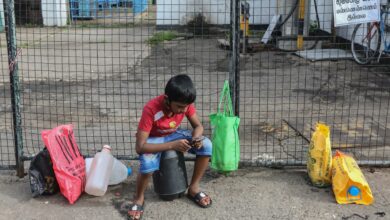War in Ukraine expected to worsen global hunger

By Lourdes Velasco
Dnipro, Ukraine, May 4 (EFE).- The war in Ukraine, a largely rural country and leading exporter of corn, grain and sunflower products, is likely to aggravate global hunger crises, according to Pierre Vauthier, head of the FAO in Ukraine.
In an interview with Efe in the western Ukrainian city of Lviv, Vauthier says the situation is fluid and differs widely across the country.
While areas near the border with Poland — those farthest away from the frontlines — have so far been relatively unaffected, farmers in southern and eastern Ukraine cannot harvest their crops because of the constant bombing, while others simply can’t find any buyers for their produce.
In the country as a whole, “at least 20 percent of the planted crops cannot be harvested,” Vauthier says.
“In Luhansk and Donetsk the situation is very dark because people cannot work the land. In other areas like Odesa, farmers have to store the crop and are trying to look for alternatives. If the war situation does not improve, the consequences will be very damaging for everyone.”
Amid the acute shortages of grain, the FAO is working to encourage other countries to step up their own production to fill the void.
“Adaptations take time,” he says. “The price of the produce will increase.”
To keep food exports at adequate levels, the FAO wants “the market to be kept open, because blocking it would have drastic consequences,” Vauthier warns.
Before the war, Interstarch LLC, a corn and wheat processing company in Dnipro, a city close to territory controlled by pro-Russian forces, exported its products from Ukrainian ports in the Black Sea to Africa. Now, however, the journey goes over land and trucks have to cross the whole of Ukraine, Europe’s second-largest country after Russia.
“The outlook is not good. Russia wants to cut off Ukraine’s access to its seaports. If we have to bring the goods first overland via Poland or Bulgaria, there will be huge losses and costs will grow,” Tetiana Zykova, the company’s sales representative, tells Efe.
Even if exporting through Ukraine’s ports were possible, it would take a long time before they would be usable again, Zykova adds. “You have to clear the mines first.”
Closer to the front lines in the Donbas, the land cannot even be worked. Vauthier says it’s not only because of the shelling: farmers do not have access to the market.
One of the FAO’s aid programs supports small-scale farmers who produce their own food so that they have access to seeds and can be self-reliant.
About 150 kilometers from Dnipro, on the road to the capital, Kyiv, a group of farmers grow sunflowers and corn on a 3,500-hectare plot of land that has so far escaped the shelling.
They know that the warehouses are full because it is not easy to get the produce out of the country, but they have faith that things will soon improve.
“What are we going to do? We cannot stop planting,” Sergei, one of the workers, tells Efe. EFE
lvp/ta/ks/jt





